Impact of Brexit on EU Regulations
VerifiedAdded on 2020/10/05
|14
|3740
|279
AI Summary
The assignment explores how Brexit affects different EU regulations. It discusses the implications of Brexit on GDPR, Brussels I regulation, and their enforceability in the UK. The document also references several books and journals, as well as online sources, to provide a comprehensive understanding of the topic.
Contribute Materials
Your contribution can guide someone’s learning journey. Share your
documents today.

Memorandum of
Advice
Advice
Secure Best Marks with AI Grader
Need help grading? Try our AI Grader for instant feedback on your assignments.

TABLE OF CONTENTS
INTRODUCTION...........................................................................................................................1
Memorandum of Advice.........................................................................................................1
CONCLUSION................................................................................................................................8
REFERENCES................................................................................................................................9
INTRODUCTION...........................................................................................................................1
Memorandum of Advice.........................................................................................................1
CONCLUSION................................................................................................................................8
REFERENCES................................................................................................................................9
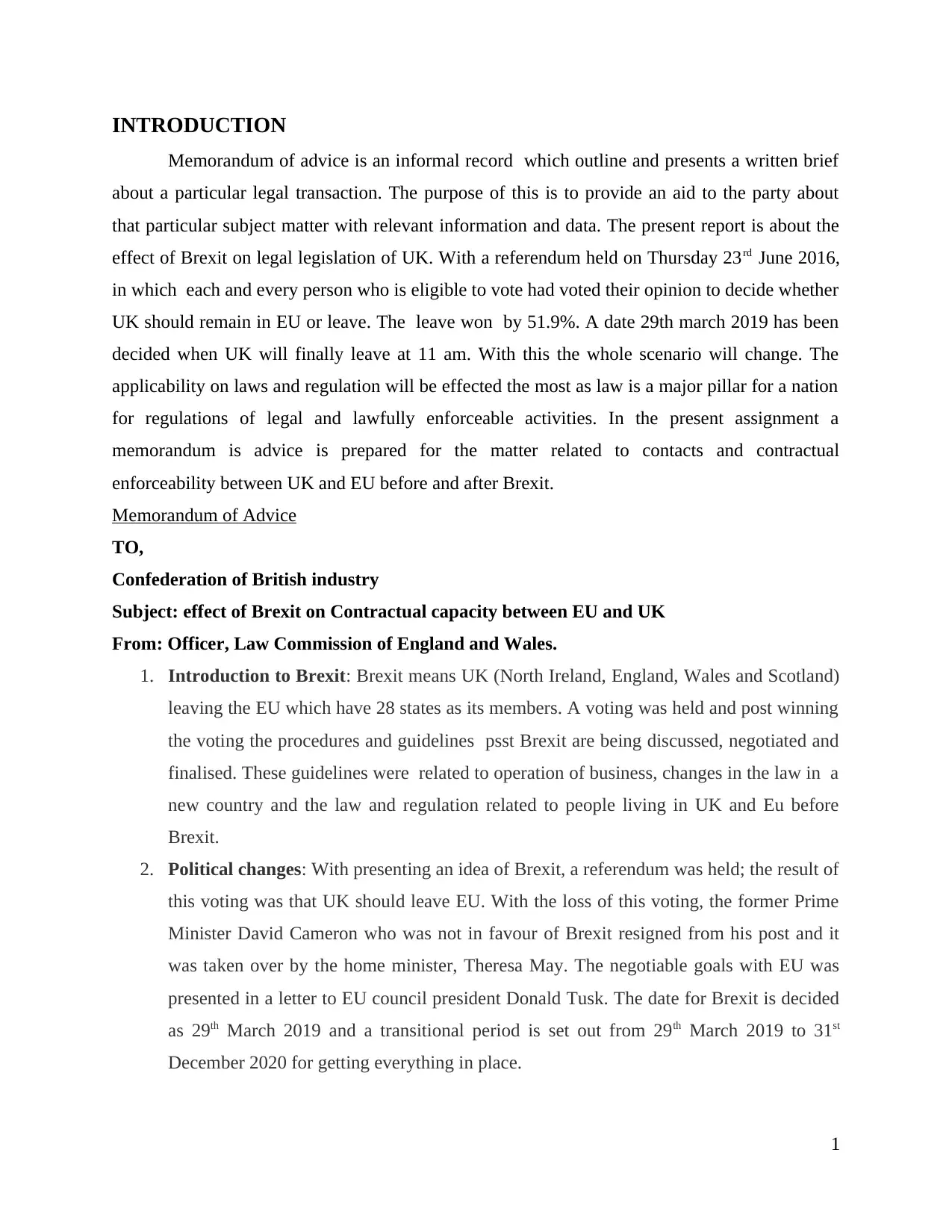
INTRODUCTION
Memorandum of advice is an informal record which outline and presents a written brief
about a particular legal transaction. The purpose of this is to provide an aid to the party about
that particular subject matter with relevant information and data. The present report is about the
effect of Brexit on legal legislation of UK. With a referendum held on Thursday 23rd June 2016,
in which each and every person who is eligible to vote had voted their opinion to decide whether
UK should remain in EU or leave. The leave won by 51.9%. A date 29th march 2019 has been
decided when UK will finally leave at 11 am. With this the whole scenario will change. The
applicability on laws and regulation will be effected the most as law is a major pillar for a nation
for regulations of legal and lawfully enforceable activities. In the present assignment a
memorandum is advice is prepared for the matter related to contacts and contractual
enforceability between UK and EU before and after Brexit.
Memorandum of Advice
TO,
Confederation of British industry
Subject: effect of Brexit on Contractual capacity between EU and UK
From: Officer, Law Commission of England and Wales.
1. Introduction to Brexit: Brexit means UK (North Ireland, England, Wales and Scotland)
leaving the EU which have 28 states as its members. A voting was held and post winning
the voting the procedures and guidelines psst Brexit are being discussed, negotiated and
finalised. These guidelines were related to operation of business, changes in the law in a
new country and the law and regulation related to people living in UK and Eu before
Brexit.
2. Political changes: With presenting an idea of Brexit, a referendum was held; the result of
this voting was that UK should leave EU. With the loss of this voting, the former Prime
Minister David Cameron who was not in favour of Brexit resigned from his post and it
was taken over by the home minister, Theresa May. The negotiable goals with EU was
presented in a letter to EU council president Donald Tusk. The date for Brexit is decided
as 29th March 2019 and a transitional period is set out from 29th March 2019 to 31st
December 2020 for getting everything in place.
1
Memorandum of advice is an informal record which outline and presents a written brief
about a particular legal transaction. The purpose of this is to provide an aid to the party about
that particular subject matter with relevant information and data. The present report is about the
effect of Brexit on legal legislation of UK. With a referendum held on Thursday 23rd June 2016,
in which each and every person who is eligible to vote had voted their opinion to decide whether
UK should remain in EU or leave. The leave won by 51.9%. A date 29th march 2019 has been
decided when UK will finally leave at 11 am. With this the whole scenario will change. The
applicability on laws and regulation will be effected the most as law is a major pillar for a nation
for regulations of legal and lawfully enforceable activities. In the present assignment a
memorandum is advice is prepared for the matter related to contacts and contractual
enforceability between UK and EU before and after Brexit.
Memorandum of Advice
TO,
Confederation of British industry
Subject: effect of Brexit on Contractual capacity between EU and UK
From: Officer, Law Commission of England and Wales.
1. Introduction to Brexit: Brexit means UK (North Ireland, England, Wales and Scotland)
leaving the EU which have 28 states as its members. A voting was held and post winning
the voting the procedures and guidelines psst Brexit are being discussed, negotiated and
finalised. These guidelines were related to operation of business, changes in the law in a
new country and the law and regulation related to people living in UK and Eu before
Brexit.
2. Political changes: With presenting an idea of Brexit, a referendum was held; the result of
this voting was that UK should leave EU. With the loss of this voting, the former Prime
Minister David Cameron who was not in favour of Brexit resigned from his post and it
was taken over by the home minister, Theresa May. The negotiable goals with EU was
presented in a letter to EU council president Donald Tusk. The date for Brexit is decided
as 29th March 2019 and a transitional period is set out from 29th March 2019 to 31st
December 2020 for getting everything in place.
1
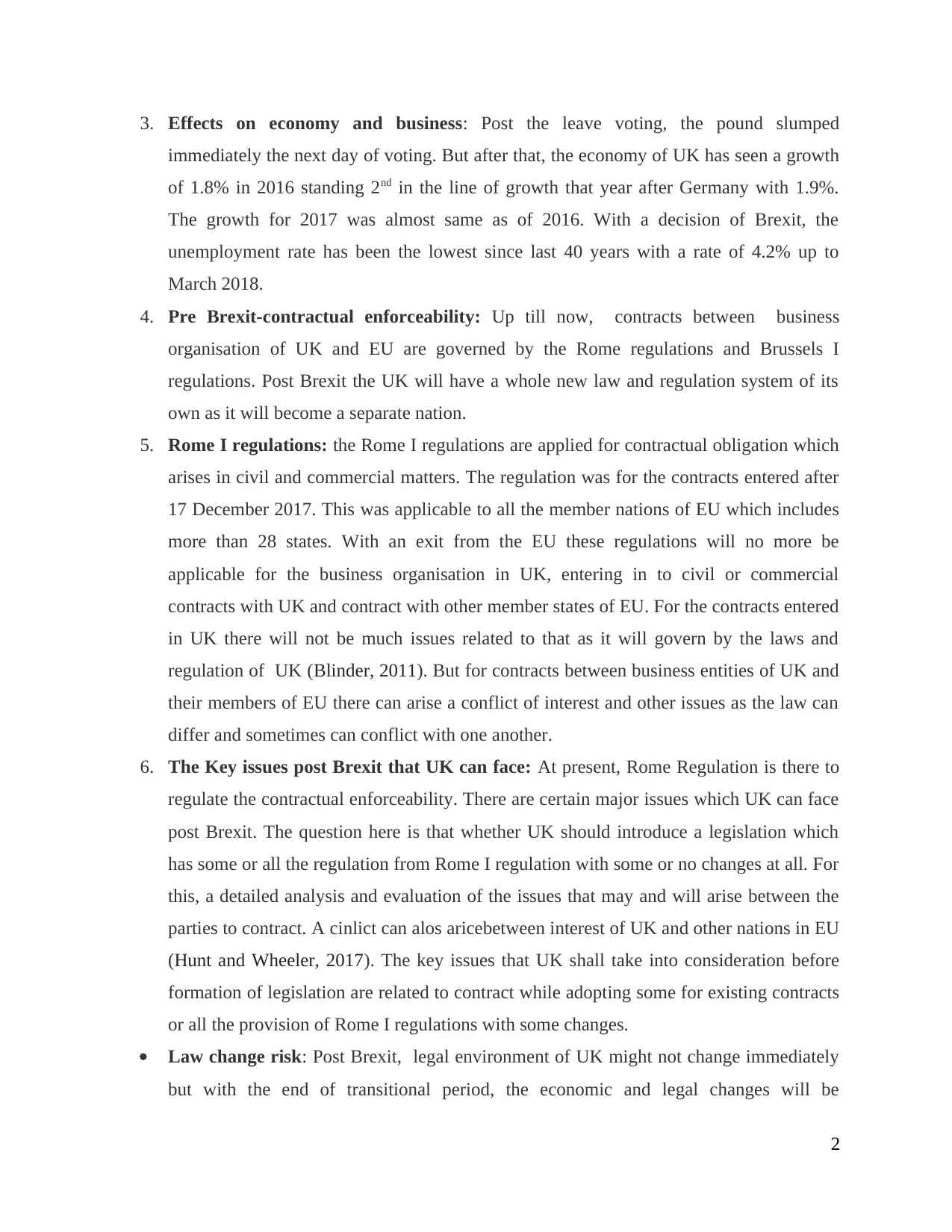
3. Effects on economy and business: Post the leave voting, the pound slumped
immediately the next day of voting. But after that, the economy of UK has seen a growth
of 1.8% in 2016 standing 2nd in the line of growth that year after Germany with 1.9%.
The growth for 2017 was almost same as of 2016. With a decision of Brexit, the
unemployment rate has been the lowest since last 40 years with a rate of 4.2% up to
March 2018.
4. Pre Brexit-contractual enforceability: Up till now, contracts between business
organisation of UK and EU are governed by the Rome regulations and Brussels I
regulations. Post Brexit the UK will have a whole new law and regulation system of its
own as it will become a separate nation.
5. Rome I regulations: the Rome I regulations are applied for contractual obligation which
arises in civil and commercial matters. The regulation was for the contracts entered after
17 December 2017. This was applicable to all the member nations of EU which includes
more than 28 states. With an exit from the EU these regulations will no more be
applicable for the business organisation in UK, entering in to civil or commercial
contracts with UK and contract with other member states of EU. For the contracts entered
in UK there will not be much issues related to that as it will govern by the laws and
regulation of UK (Blinder, 2011). But for contracts between business entities of UK and
their members of EU there can arise a conflict of interest and other issues as the law can
differ and sometimes can conflict with one another.
6. The Key issues post Brexit that UK can face: At present, Rome Regulation is there to
regulate the contractual enforceability. There are certain major issues which UK can face
post Brexit. The question here is that whether UK should introduce a legislation which
has some or all the regulation from Rome I regulation with some or no changes at all. For
this, a detailed analysis and evaluation of the issues that may and will arise between the
parties to contract. A cinlict can alos aricebetween interest of UK and other nations in EU
(Hunt and Wheeler, 2017). The key issues that UK shall take into consideration before
formation of legislation are related to contract while adopting some for existing contracts
or all the provision of Rome I regulations with some changes.
Law change risk: Post Brexit, legal environment of UK might not change immediately
but with the end of transitional period, the economic and legal changes will be
2
immediately the next day of voting. But after that, the economy of UK has seen a growth
of 1.8% in 2016 standing 2nd in the line of growth that year after Germany with 1.9%.
The growth for 2017 was almost same as of 2016. With a decision of Brexit, the
unemployment rate has been the lowest since last 40 years with a rate of 4.2% up to
March 2018.
4. Pre Brexit-contractual enforceability: Up till now, contracts between business
organisation of UK and EU are governed by the Rome regulations and Brussels I
regulations. Post Brexit the UK will have a whole new law and regulation system of its
own as it will become a separate nation.
5. Rome I regulations: the Rome I regulations are applied for contractual obligation which
arises in civil and commercial matters. The regulation was for the contracts entered after
17 December 2017. This was applicable to all the member nations of EU which includes
more than 28 states. With an exit from the EU these regulations will no more be
applicable for the business organisation in UK, entering in to civil or commercial
contracts with UK and contract with other member states of EU. For the contracts entered
in UK there will not be much issues related to that as it will govern by the laws and
regulation of UK (Blinder, 2011). But for contracts between business entities of UK and
their members of EU there can arise a conflict of interest and other issues as the law can
differ and sometimes can conflict with one another.
6. The Key issues post Brexit that UK can face: At present, Rome Regulation is there to
regulate the contractual enforceability. There are certain major issues which UK can face
post Brexit. The question here is that whether UK should introduce a legislation which
has some or all the regulation from Rome I regulation with some or no changes at all. For
this, a detailed analysis and evaluation of the issues that may and will arise between the
parties to contract. A cinlict can alos aricebetween interest of UK and other nations in EU
(Hunt and Wheeler, 2017). The key issues that UK shall take into consideration before
formation of legislation are related to contract while adopting some for existing contracts
or all the provision of Rome I regulations with some changes.
Law change risk: Post Brexit, legal environment of UK might not change immediately
but with the end of transitional period, the economic and legal changes will be
2
Secure Best Marks with AI Grader
Need help grading? Try our AI Grader for instant feedback on your assignments.
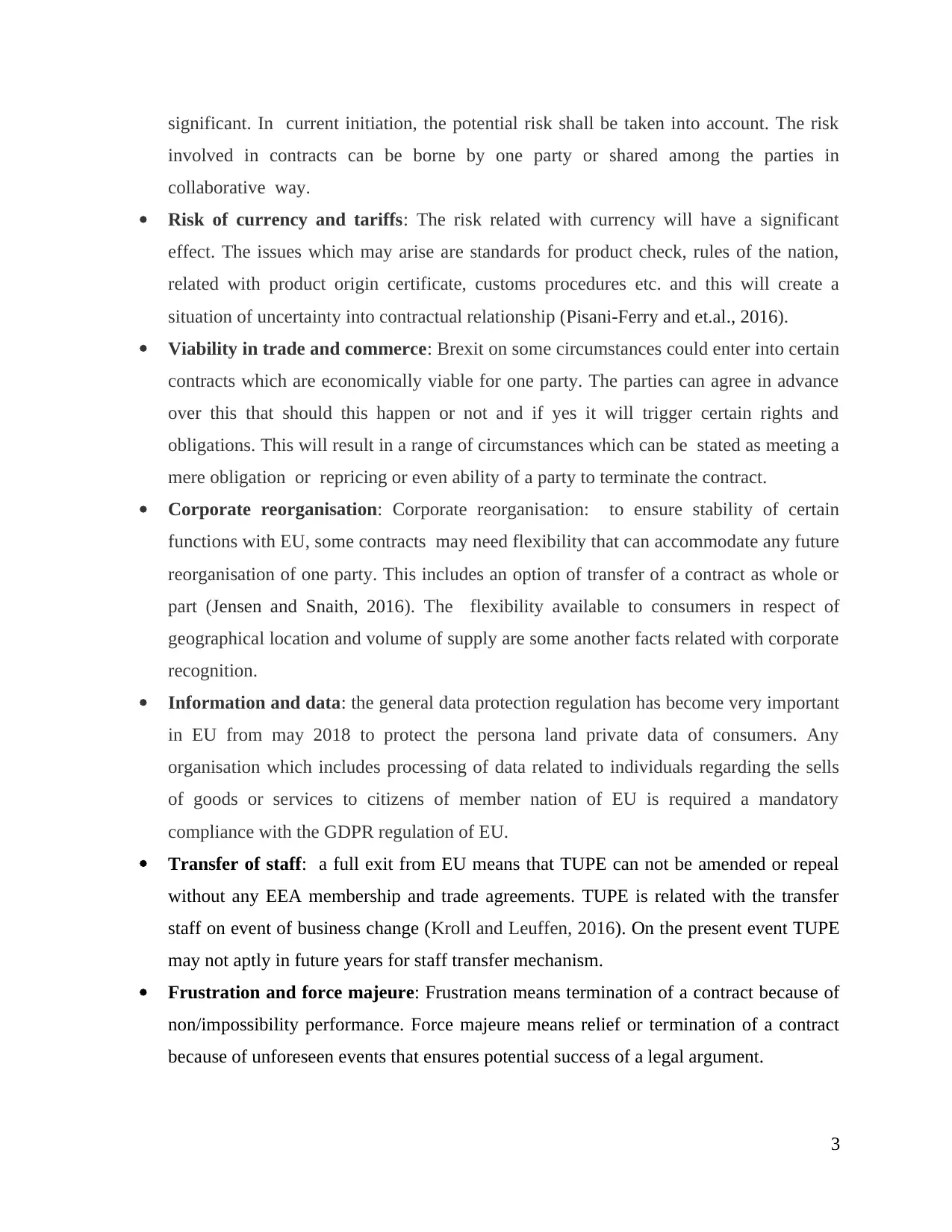
significant. In current initiation, the potential risk shall be taken into account. The risk
involved in contracts can be borne by one party or shared among the parties in
collaborative way.
Risk of currency and tariffs: The risk related with currency will have a significant
effect. The issues which may arise are standards for product check, rules of the nation,
related with product origin certificate, customs procedures etc. and this will create a
situation of uncertainty into contractual relationship (Pisani-Ferry and et.al., 2016).
Viability in trade and commerce: Brexit on some circumstances could enter into certain
contracts which are economically viable for one party. The parties can agree in advance
over this that should this happen or not and if yes it will trigger certain rights and
obligations. This will result in a range of circumstances which can be stated as meeting a
mere obligation or repricing or even ability of a party to terminate the contract.
Corporate reorganisation: Corporate reorganisation: to ensure stability of certain
functions with EU, some contracts may need flexibility that can accommodate any future
reorganisation of one party. This includes an option of transfer of a contract as whole or
part (Jensen and Snaith, 2016). The flexibility available to consumers in respect of
geographical location and volume of supply are some another facts related with corporate
recognition.
Information and data: the general data protection regulation has become very important
in EU from may 2018 to protect the persona land private data of consumers. Any
organisation which includes processing of data related to individuals regarding the sells
of goods or services to citizens of member nation of EU is required a mandatory
compliance with the GDPR regulation of EU.
Transfer of staff: a full exit from EU means that TUPE can not be amended or repeal
without any EEA membership and trade agreements. TUPE is related with the transfer
staff on event of business change (Kroll and Leuffen, 2016). On the present event TUPE
may not aptly in future years for staff transfer mechanism.
Frustration and force majeure: Frustration means termination of a contract because of
non/impossibility performance. Force majeure means relief or termination of a contract
because of unforeseen events that ensures potential success of a legal argument.
3
involved in contracts can be borne by one party or shared among the parties in
collaborative way.
Risk of currency and tariffs: The risk related with currency will have a significant
effect. The issues which may arise are standards for product check, rules of the nation,
related with product origin certificate, customs procedures etc. and this will create a
situation of uncertainty into contractual relationship (Pisani-Ferry and et.al., 2016).
Viability in trade and commerce: Brexit on some circumstances could enter into certain
contracts which are economically viable for one party. The parties can agree in advance
over this that should this happen or not and if yes it will trigger certain rights and
obligations. This will result in a range of circumstances which can be stated as meeting a
mere obligation or repricing or even ability of a party to terminate the contract.
Corporate reorganisation: Corporate reorganisation: to ensure stability of certain
functions with EU, some contracts may need flexibility that can accommodate any future
reorganisation of one party. This includes an option of transfer of a contract as whole or
part (Jensen and Snaith, 2016). The flexibility available to consumers in respect of
geographical location and volume of supply are some another facts related with corporate
recognition.
Information and data: the general data protection regulation has become very important
in EU from may 2018 to protect the persona land private data of consumers. Any
organisation which includes processing of data related to individuals regarding the sells
of goods or services to citizens of member nation of EU is required a mandatory
compliance with the GDPR regulation of EU.
Transfer of staff: a full exit from EU means that TUPE can not be amended or repeal
without any EEA membership and trade agreements. TUPE is related with the transfer
staff on event of business change (Kroll and Leuffen, 2016). On the present event TUPE
may not aptly in future years for staff transfer mechanism.
Frustration and force majeure: Frustration means termination of a contract because of
non/impossibility performance. Force majeure means relief or termination of a contract
because of unforeseen events that ensures potential success of a legal argument.
3
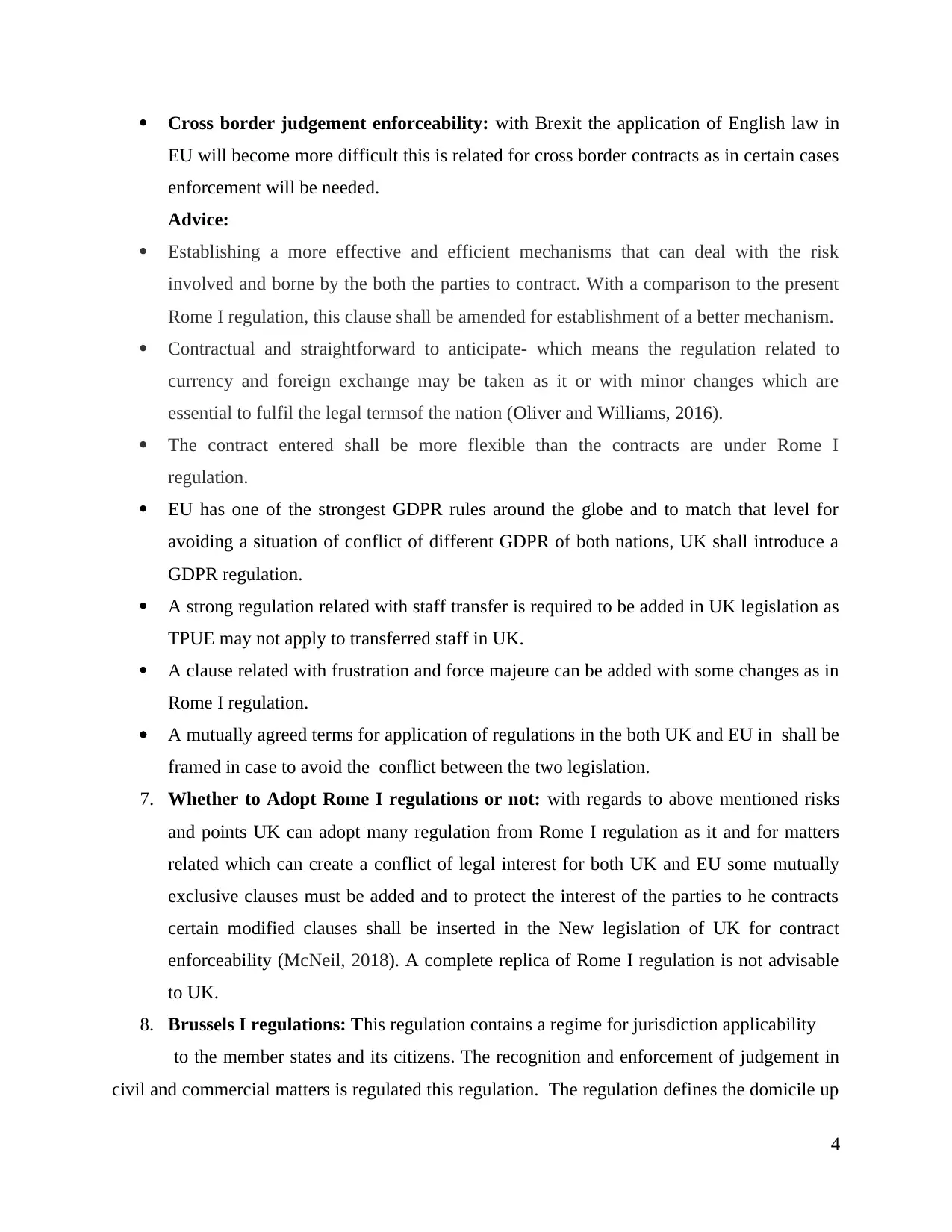
Cross border judgement enforceability: with Brexit the application of English law in
EU will become more difficult this is related for cross border contracts as in certain cases
enforcement will be needed.
Advice:
Establishing a more effective and efficient mechanisms that can deal with the risk
involved and borne by the both the parties to contract. With a comparison to the present
Rome I regulation, this clause shall be amended for establishment of a better mechanism.
Contractual and straightforward to anticipate- which means the regulation related to
currency and foreign exchange may be taken as it or with minor changes which are
essential to fulfil the legal termsof the nation (Oliver and Williams, 2016).
The contract entered shall be more flexible than the contracts are under Rome I
regulation.
EU has one of the strongest GDPR rules around the globe and to match that level for
avoiding a situation of conflict of different GDPR of both nations, UK shall introduce a
GDPR regulation.
A strong regulation related with staff transfer is required to be added in UK legislation as
TPUE may not apply to transferred staff in UK.
A clause related with frustration and force majeure can be added with some changes as in
Rome I regulation.
A mutually agreed terms for application of regulations in the both UK and EU in shall be
framed in case to avoid the conflict between the two legislation.
7. Whether to Adopt Rome I regulations or not: with regards to above mentioned risks
and points UK can adopt many regulation from Rome I regulation as it and for matters
related which can create a conflict of legal interest for both UK and EU some mutually
exclusive clauses must be added and to protect the interest of the parties to he contracts
certain modified clauses shall be inserted in the New legislation of UK for contract
enforceability (McNeil, 2018). A complete replica of Rome I regulation is not advisable
to UK.
8. Brussels I regulations: This regulation contains a regime for jurisdiction applicability
to the member states and its citizens. The recognition and enforcement of judgement in
civil and commercial matters is regulated this regulation. The regulation defines the domicile up
4
EU will become more difficult this is related for cross border contracts as in certain cases
enforcement will be needed.
Advice:
Establishing a more effective and efficient mechanisms that can deal with the risk
involved and borne by the both the parties to contract. With a comparison to the present
Rome I regulation, this clause shall be amended for establishment of a better mechanism.
Contractual and straightforward to anticipate- which means the regulation related to
currency and foreign exchange may be taken as it or with minor changes which are
essential to fulfil the legal termsof the nation (Oliver and Williams, 2016).
The contract entered shall be more flexible than the contracts are under Rome I
regulation.
EU has one of the strongest GDPR rules around the globe and to match that level for
avoiding a situation of conflict of different GDPR of both nations, UK shall introduce a
GDPR regulation.
A strong regulation related with staff transfer is required to be added in UK legislation as
TPUE may not apply to transferred staff in UK.
A clause related with frustration and force majeure can be added with some changes as in
Rome I regulation.
A mutually agreed terms for application of regulations in the both UK and EU in shall be
framed in case to avoid the conflict between the two legislation.
7. Whether to Adopt Rome I regulations or not: with regards to above mentioned risks
and points UK can adopt many regulation from Rome I regulation as it and for matters
related which can create a conflict of legal interest for both UK and EU some mutually
exclusive clauses must be added and to protect the interest of the parties to he contracts
certain modified clauses shall be inserted in the New legislation of UK for contract
enforceability (McNeil, 2018). A complete replica of Rome I regulation is not advisable
to UK.
8. Brussels I regulations: This regulation contains a regime for jurisdiction applicability
to the member states and its citizens. The recognition and enforcement of judgement in
civil and commercial matters is regulated this regulation. The regulation defines the domicile up
4
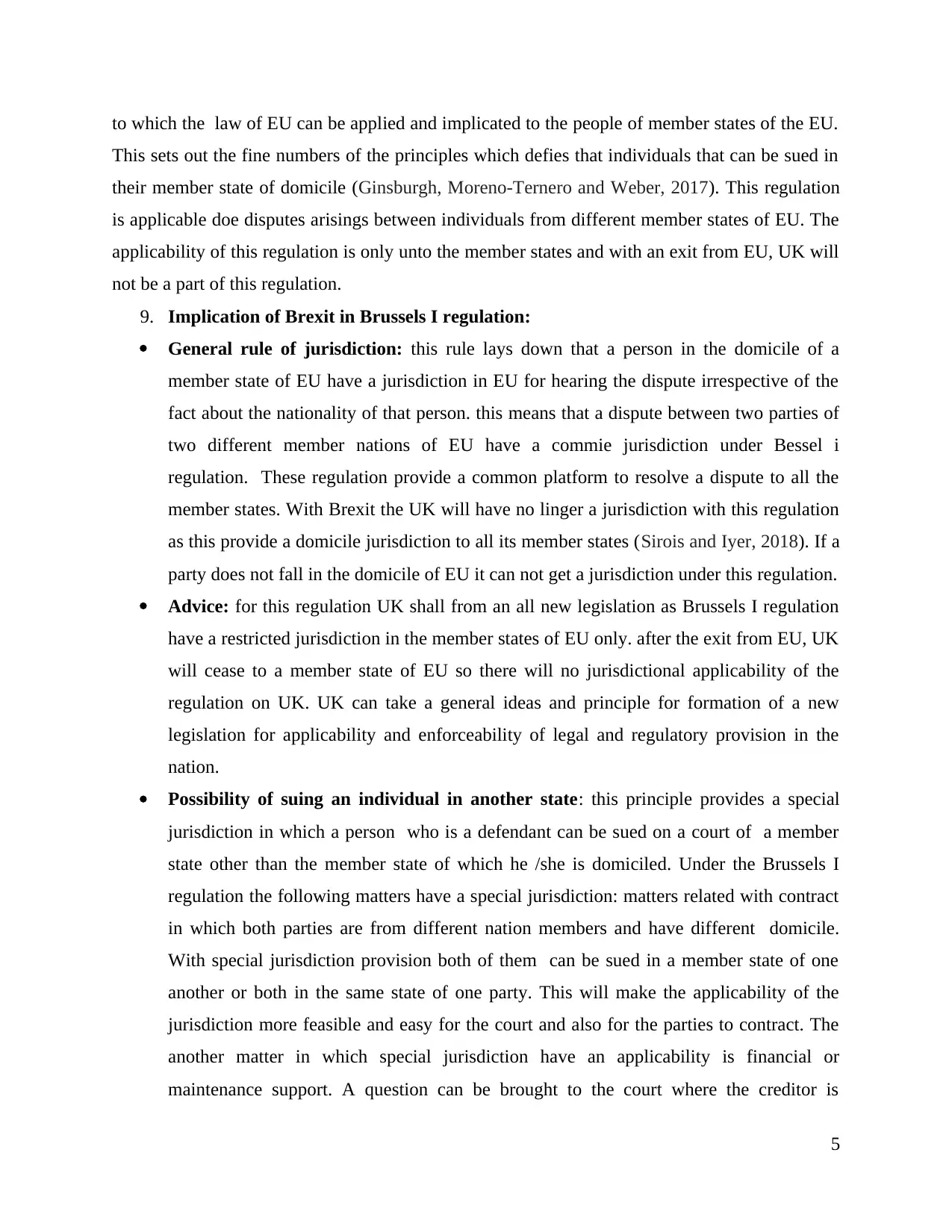
to which the law of EU can be applied and implicated to the people of member states of the EU.
This sets out the fine numbers of the principles which defies that individuals that can be sued in
their member state of domicile (Ginsburgh, Moreno-Ternero and Weber, 2017). This regulation
is applicable doe disputes arisings between individuals from different member states of EU. The
applicability of this regulation is only unto the member states and with an exit from EU, UK will
not be a part of this regulation.
9. Implication of Brexit in Brussels I regulation:
General rule of jurisdiction: this rule lays down that a person in the domicile of a
member state of EU have a jurisdiction in EU for hearing the dispute irrespective of the
fact about the nationality of that person. this means that a dispute between two parties of
two different member nations of EU have a commie jurisdiction under Bessel i
regulation. These regulation provide a common platform to resolve a dispute to all the
member states. With Brexit the UK will have no linger a jurisdiction with this regulation
as this provide a domicile jurisdiction to all its member states (Sirois and Iyer, 2018). If a
party does not fall in the domicile of EU it can not get a jurisdiction under this regulation.
Advice: for this regulation UK shall from an all new legislation as Brussels I regulation
have a restricted jurisdiction in the member states of EU only. after the exit from EU, UK
will cease to a member state of EU so there will no jurisdictional applicability of the
regulation on UK. UK can take a general ideas and principle for formation of a new
legislation for applicability and enforceability of legal and regulatory provision in the
nation.
Possibility of suing an individual in another state: this principle provides a special
jurisdiction in which a person who is a defendant can be sued on a court of a member
state other than the member state of which he /she is domiciled. Under the Brussels I
regulation the following matters have a special jurisdiction: matters related with contract
in which both parties are from different nation members and have different domicile.
With special jurisdiction provision both of them can be sued in a member state of one
another or both in the same state of one party. This will make the applicability of the
jurisdiction more feasible and easy for the court and also for the parties to contract. The
another matter in which special jurisdiction have an applicability is financial or
maintenance support. A question can be brought to the court where the creditor is
5
This sets out the fine numbers of the principles which defies that individuals that can be sued in
their member state of domicile (Ginsburgh, Moreno-Ternero and Weber, 2017). This regulation
is applicable doe disputes arisings between individuals from different member states of EU. The
applicability of this regulation is only unto the member states and with an exit from EU, UK will
not be a part of this regulation.
9. Implication of Brexit in Brussels I regulation:
General rule of jurisdiction: this rule lays down that a person in the domicile of a
member state of EU have a jurisdiction in EU for hearing the dispute irrespective of the
fact about the nationality of that person. this means that a dispute between two parties of
two different member nations of EU have a commie jurisdiction under Bessel i
regulation. These regulation provide a common platform to resolve a dispute to all the
member states. With Brexit the UK will have no linger a jurisdiction with this regulation
as this provide a domicile jurisdiction to all its member states (Sirois and Iyer, 2018). If a
party does not fall in the domicile of EU it can not get a jurisdiction under this regulation.
Advice: for this regulation UK shall from an all new legislation as Brussels I regulation
have a restricted jurisdiction in the member states of EU only. after the exit from EU, UK
will cease to a member state of EU so there will no jurisdictional applicability of the
regulation on UK. UK can take a general ideas and principle for formation of a new
legislation for applicability and enforceability of legal and regulatory provision in the
nation.
Possibility of suing an individual in another state: this principle provides a special
jurisdiction in which a person who is a defendant can be sued on a court of a member
state other than the member state of which he /she is domiciled. Under the Brussels I
regulation the following matters have a special jurisdiction: matters related with contract
in which both parties are from different nation members and have different domicile.
With special jurisdiction provision both of them can be sued in a member state of one
another or both in the same state of one party. This will make the applicability of the
jurisdiction more feasible and easy for the court and also for the parties to contract. The
another matter in which special jurisdiction have an applicability is financial or
maintenance support. A question can be brought to the court where the creditor is
5
Paraphrase This Document
Need a fresh take? Get an instant paraphrase of this document with our AI Paraphraser
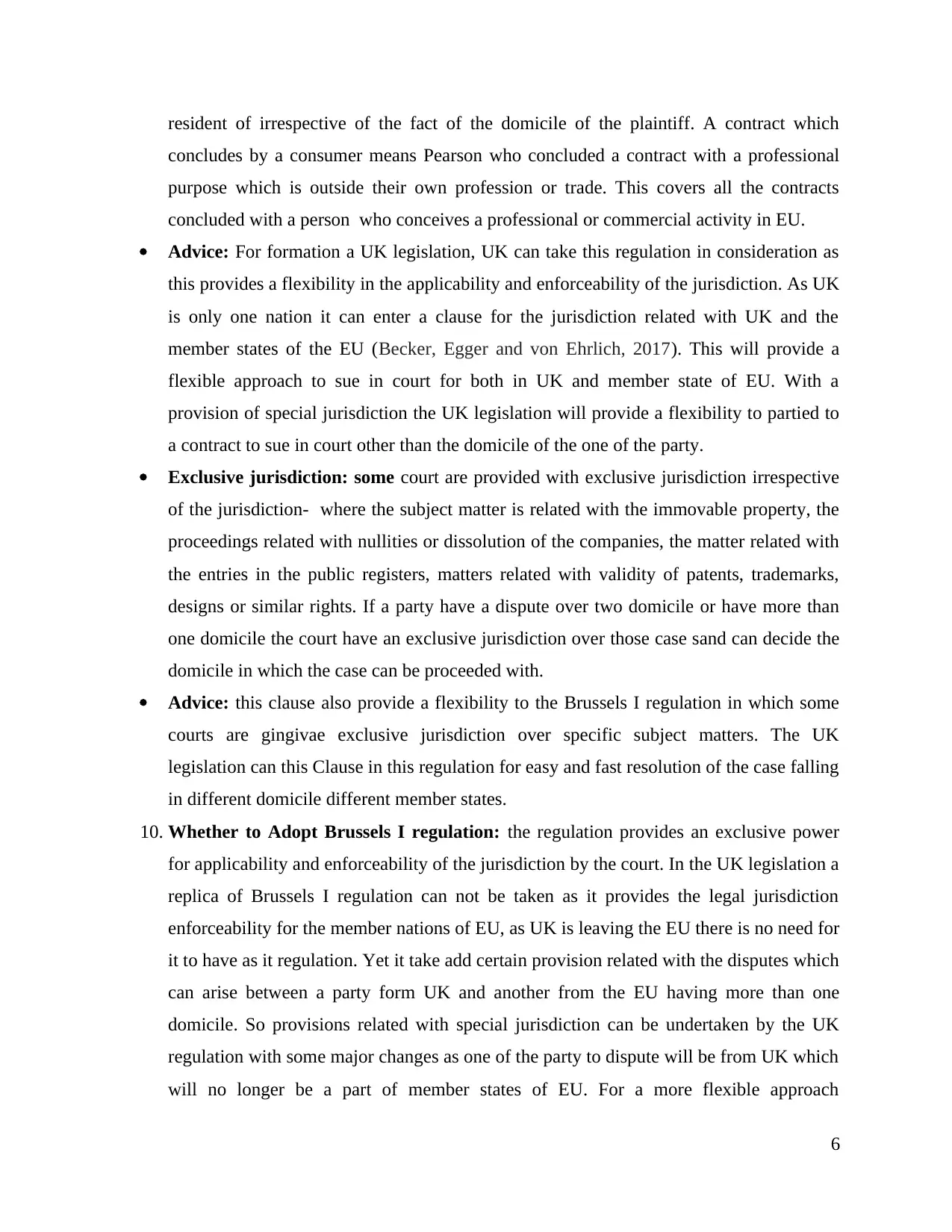
resident of irrespective of the fact of the domicile of the plaintiff. A contract which
concludes by a consumer means Pearson who concluded a contract with a professional
purpose which is outside their own profession or trade. This covers all the contracts
concluded with a person who conceives a professional or commercial activity in EU.
Advice: For formation a UK legislation, UK can take this regulation in consideration as
this provides a flexibility in the applicability and enforceability of the jurisdiction. As UK
is only one nation it can enter a clause for the jurisdiction related with UK and the
member states of the EU (Becker, Egger and von Ehrlich, 2017). This will provide a
flexible approach to sue in court for both in UK and member state of EU. With a
provision of special jurisdiction the UK legislation will provide a flexibility to partied to
a contract to sue in court other than the domicile of the one of the party.
Exclusive jurisdiction: some court are provided with exclusive jurisdiction irrespective
of the jurisdiction- where the subject matter is related with the immovable property, the
proceedings related with nullities or dissolution of the companies, the matter related with
the entries in the public registers, matters related with validity of patents, trademarks,
designs or similar rights. If a party have a dispute over two domicile or have more than
one domicile the court have an exclusive jurisdiction over those case sand can decide the
domicile in which the case can be proceeded with.
Advice: this clause also provide a flexibility to the Brussels I regulation in which some
courts are gingivae exclusive jurisdiction over specific subject matters. The UK
legislation can this Clause in this regulation for easy and fast resolution of the case falling
in different domicile different member states.
10. Whether to Adopt Brussels I regulation: the regulation provides an exclusive power
for applicability and enforceability of the jurisdiction by the court. In the UK legislation a
replica of Brussels I regulation can not be taken as it provides the legal jurisdiction
enforceability for the member nations of EU, as UK is leaving the EU there is no need for
it to have as it regulation. Yet it take add certain provision related with the disputes which
can arise between a party form UK and another from the EU having more than one
domicile. So provisions related with special jurisdiction can be undertaken by the UK
regulation with some major changes as one of the party to dispute will be from UK which
will no longer be a part of member states of EU. For a more flexible approach
6
concludes by a consumer means Pearson who concluded a contract with a professional
purpose which is outside their own profession or trade. This covers all the contracts
concluded with a person who conceives a professional or commercial activity in EU.
Advice: For formation a UK legislation, UK can take this regulation in consideration as
this provides a flexibility in the applicability and enforceability of the jurisdiction. As UK
is only one nation it can enter a clause for the jurisdiction related with UK and the
member states of the EU (Becker, Egger and von Ehrlich, 2017). This will provide a
flexible approach to sue in court for both in UK and member state of EU. With a
provision of special jurisdiction the UK legislation will provide a flexibility to partied to
a contract to sue in court other than the domicile of the one of the party.
Exclusive jurisdiction: some court are provided with exclusive jurisdiction irrespective
of the jurisdiction- where the subject matter is related with the immovable property, the
proceedings related with nullities or dissolution of the companies, the matter related with
the entries in the public registers, matters related with validity of patents, trademarks,
designs or similar rights. If a party have a dispute over two domicile or have more than
one domicile the court have an exclusive jurisdiction over those case sand can decide the
domicile in which the case can be proceeded with.
Advice: this clause also provide a flexibility to the Brussels I regulation in which some
courts are gingivae exclusive jurisdiction over specific subject matters. The UK
legislation can this Clause in this regulation for easy and fast resolution of the case falling
in different domicile different member states.
10. Whether to Adopt Brussels I regulation: the regulation provides an exclusive power
for applicability and enforceability of the jurisdiction by the court. In the UK legislation a
replica of Brussels I regulation can not be taken as it provides the legal jurisdiction
enforceability for the member nations of EU, as UK is leaving the EU there is no need for
it to have as it regulation. Yet it take add certain provision related with the disputes which
can arise between a party form UK and another from the EU having more than one
domicile. So provisions related with special jurisdiction can be undertaken by the UK
regulation with some major changes as one of the party to dispute will be from UK which
will no longer be a part of member states of EU. For a more flexible approach
6
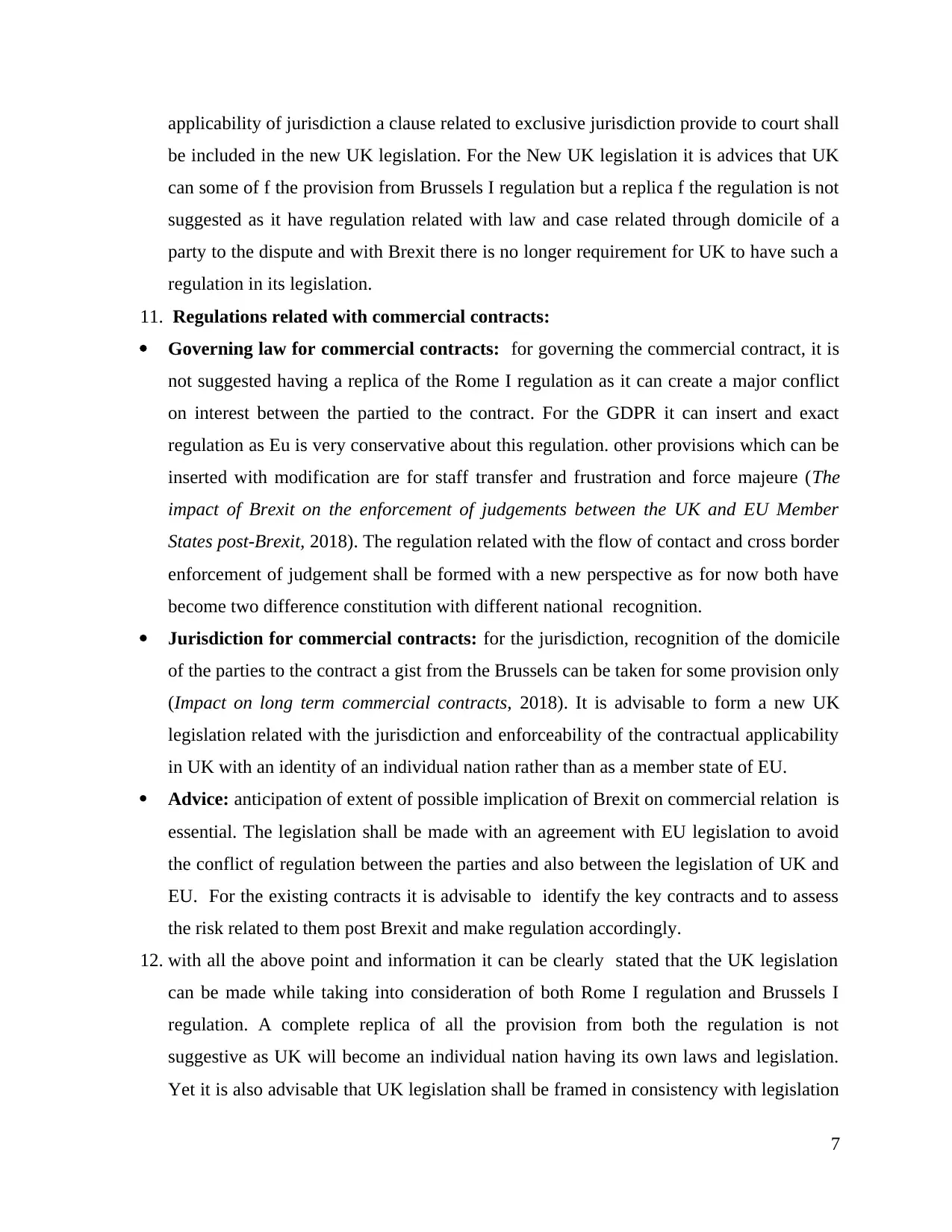
applicability of jurisdiction a clause related to exclusive jurisdiction provide to court shall
be included in the new UK legislation. For the New UK legislation it is advices that UK
can some of f the provision from Brussels I regulation but a replica f the regulation is not
suggested as it have regulation related with law and case related through domicile of a
party to the dispute and with Brexit there is no longer requirement for UK to have such a
regulation in its legislation.
11. Regulations related with commercial contracts:
Governing law for commercial contracts: for governing the commercial contract, it is
not suggested having a replica of the Rome I regulation as it can create a major conflict
on interest between the partied to the contract. For the GDPR it can insert and exact
regulation as Eu is very conservative about this regulation. other provisions which can be
inserted with modification are for staff transfer and frustration and force majeure (The
impact of Brexit on the enforcement of judgements between the UK and EU Member
States post-Brexit, 2018). The regulation related with the flow of contact and cross border
enforcement of judgement shall be formed with a new perspective as for now both have
become two difference constitution with different national recognition.
Jurisdiction for commercial contracts: for the jurisdiction, recognition of the domicile
of the parties to the contract a gist from the Brussels can be taken for some provision only
(Impact on long term commercial contracts, 2018). It is advisable to form a new UK
legislation related with the jurisdiction and enforceability of the contractual applicability
in UK with an identity of an individual nation rather than as a member state of EU.
Advice: anticipation of extent of possible implication of Brexit on commercial relation is
essential. The legislation shall be made with an agreement with EU legislation to avoid
the conflict of regulation between the parties and also between the legislation of UK and
EU. For the existing contracts it is advisable to identify the key contracts and to assess
the risk related to them post Brexit and make regulation accordingly.
12. with all the above point and information it can be clearly stated that the UK legislation
can be made while taking into consideration of both Rome I regulation and Brussels I
regulation. A complete replica of all the provision from both the regulation is not
suggestive as UK will become an individual nation having its own laws and legislation.
Yet it is also advisable that UK legislation shall be framed in consistency with legislation
7
be included in the new UK legislation. For the New UK legislation it is advices that UK
can some of f the provision from Brussels I regulation but a replica f the regulation is not
suggested as it have regulation related with law and case related through domicile of a
party to the dispute and with Brexit there is no longer requirement for UK to have such a
regulation in its legislation.
11. Regulations related with commercial contracts:
Governing law for commercial contracts: for governing the commercial contract, it is
not suggested having a replica of the Rome I regulation as it can create a major conflict
on interest between the partied to the contract. For the GDPR it can insert and exact
regulation as Eu is very conservative about this regulation. other provisions which can be
inserted with modification are for staff transfer and frustration and force majeure (The
impact of Brexit on the enforcement of judgements between the UK and EU Member
States post-Brexit, 2018). The regulation related with the flow of contact and cross border
enforcement of judgement shall be formed with a new perspective as for now both have
become two difference constitution with different national recognition.
Jurisdiction for commercial contracts: for the jurisdiction, recognition of the domicile
of the parties to the contract a gist from the Brussels can be taken for some provision only
(Impact on long term commercial contracts, 2018). It is advisable to form a new UK
legislation related with the jurisdiction and enforceability of the contractual applicability
in UK with an identity of an individual nation rather than as a member state of EU.
Advice: anticipation of extent of possible implication of Brexit on commercial relation is
essential. The legislation shall be made with an agreement with EU legislation to avoid
the conflict of regulation between the parties and also between the legislation of UK and
EU. For the existing contracts it is advisable to identify the key contracts and to assess
the risk related to them post Brexit and make regulation accordingly.
12. with all the above point and information it can be clearly stated that the UK legislation
can be made while taking into consideration of both Rome I regulation and Brussels I
regulation. A complete replica of all the provision from both the regulation is not
suggestive as UK will become an individual nation having its own laws and legislation.
Yet it is also advisable that UK legislation shall be framed in consistency with legislation
7
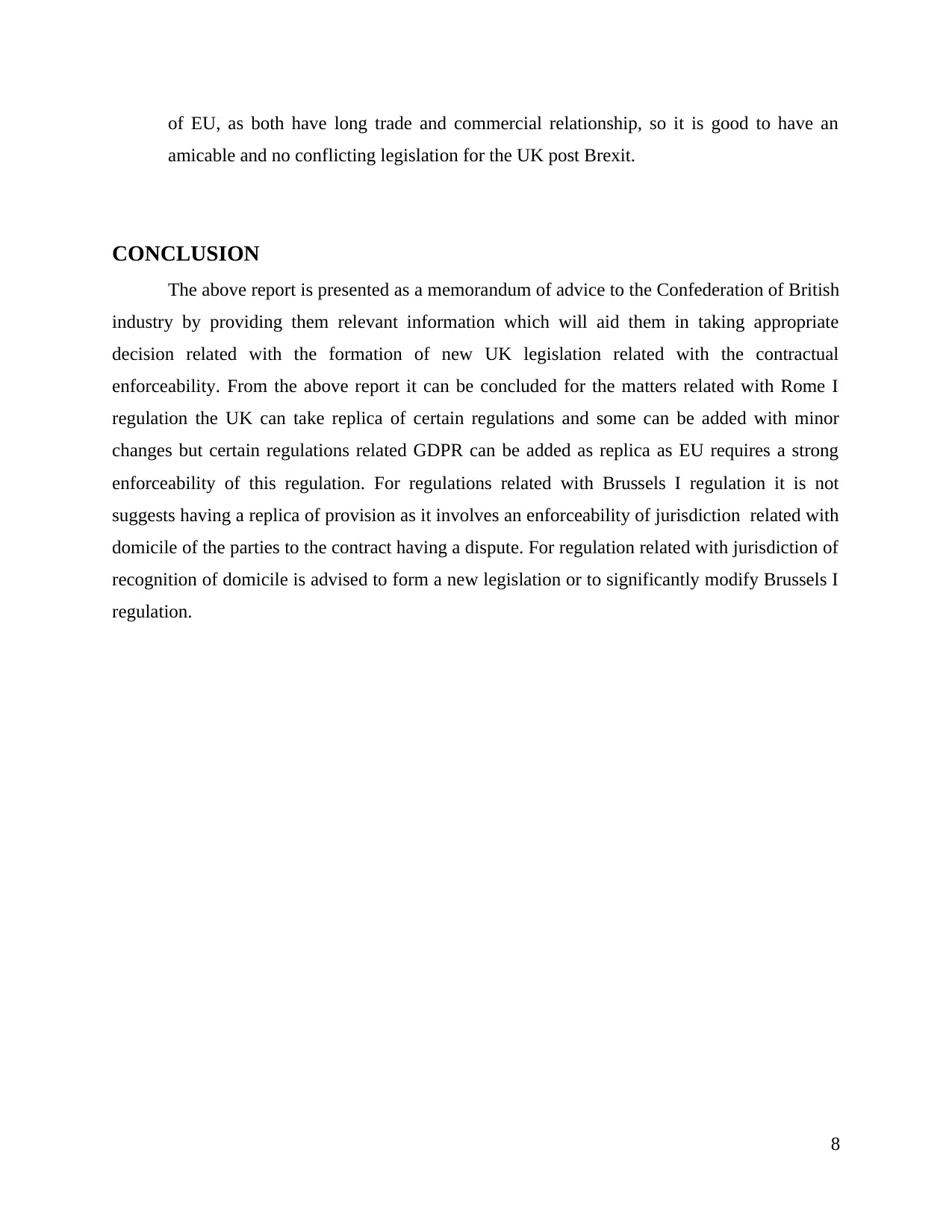
of EU, as both have long trade and commercial relationship, so it is good to have an
amicable and no conflicting legislation for the UK post Brexit.
CONCLUSION
The above report is presented as a memorandum of advice to the Confederation of British
industry by providing them relevant information which will aid them in taking appropriate
decision related with the formation of new UK legislation related with the contractual
enforceability. From the above report it can be concluded for the matters related with Rome I
regulation the UK can take replica of certain regulations and some can be added with minor
changes but certain regulations related GDPR can be added as replica as EU requires a strong
enforceability of this regulation. For regulations related with Brussels I regulation it is not
suggests having a replica of provision as it involves an enforceability of jurisdiction related with
domicile of the parties to the contract having a dispute. For regulation related with jurisdiction of
recognition of domicile is advised to form a new legislation or to significantly modify Brussels I
regulation.
8
amicable and no conflicting legislation for the UK post Brexit.
CONCLUSION
The above report is presented as a memorandum of advice to the Confederation of British
industry by providing them relevant information which will aid them in taking appropriate
decision related with the formation of new UK legislation related with the contractual
enforceability. From the above report it can be concluded for the matters related with Rome I
regulation the UK can take replica of certain regulations and some can be added with minor
changes but certain regulations related GDPR can be added as replica as EU requires a strong
enforceability of this regulation. For regulations related with Brussels I regulation it is not
suggests having a replica of provision as it involves an enforceability of jurisdiction related with
domicile of the parties to the contract having a dispute. For regulation related with jurisdiction of
recognition of domicile is advised to form a new legislation or to significantly modify Brussels I
regulation.
8
Secure Best Marks with AI Grader
Need help grading? Try our AI Grader for instant feedback on your assignments.
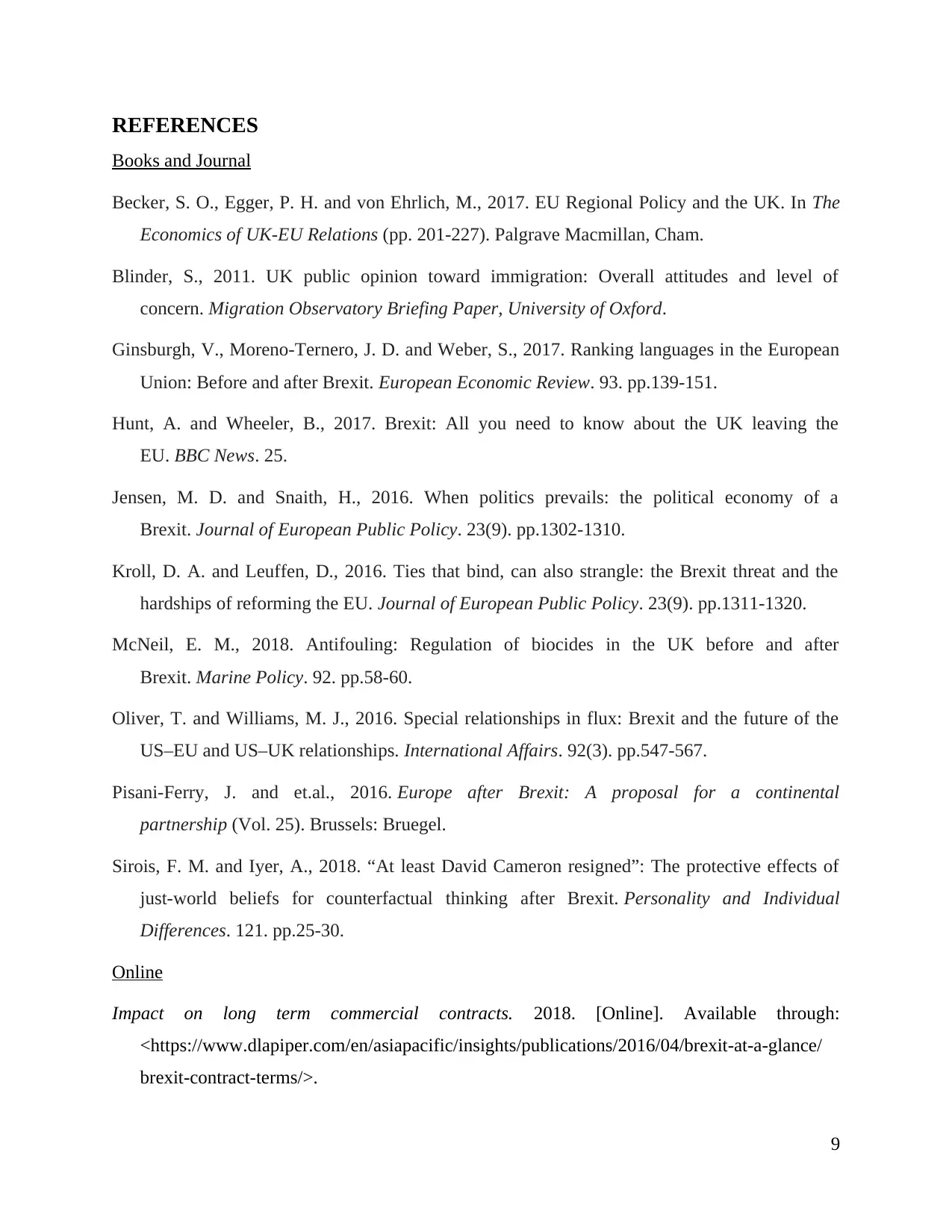
REFERENCES
Books and Journal
Becker, S. O., Egger, P. H. and von Ehrlich, M., 2017. EU Regional Policy and the UK. In The
Economics of UK-EU Relations (pp. 201-227). Palgrave Macmillan, Cham.
Blinder, S., 2011. UK public opinion toward immigration: Overall attitudes and level of
concern. Migration Observatory Briefing Paper, University of Oxford.
Ginsburgh, V., Moreno-Ternero, J. D. and Weber, S., 2017. Ranking languages in the European
Union: Before and after Brexit. European Economic Review. 93. pp.139-151.
Hunt, A. and Wheeler, B., 2017. Brexit: All you need to know about the UK leaving the
EU. BBC News. 25.
Jensen, M. D. and Snaith, H., 2016. When politics prevails: the political economy of a
Brexit. Journal of European Public Policy. 23(9). pp.1302-1310.
Kroll, D. A. and Leuffen, D., 2016. Ties that bind, can also strangle: the Brexit threat and the
hardships of reforming the EU. Journal of European Public Policy. 23(9). pp.1311-1320.
McNeil, E. M., 2018. Antifouling: Regulation of biocides in the UK before and after
Brexit. Marine Policy. 92. pp.58-60.
Oliver, T. and Williams, M. J., 2016. Special relationships in flux: Brexit and the future of the
US–EU and US–UK relationships. International Affairs. 92(3). pp.547-567.
Pisani-Ferry, J. and et.al., 2016. Europe after Brexit: A proposal for a continental
partnership (Vol. 25). Brussels: Bruegel.
Sirois, F. M. and Iyer, A., 2018. “At least David Cameron resigned”: The protective effects of
just-world beliefs for counterfactual thinking after Brexit. Personality and Individual
Differences. 121. pp.25-30.
Online
Impact on long term commercial contracts. 2018. [Online]. Available through:
<https://www.dlapiper.com/en/asiapacific/insights/publications/2016/04/brexit-at-a-glance/
brexit-contract-terms/>.
9
Books and Journal
Becker, S. O., Egger, P. H. and von Ehrlich, M., 2017. EU Regional Policy and the UK. In The
Economics of UK-EU Relations (pp. 201-227). Palgrave Macmillan, Cham.
Blinder, S., 2011. UK public opinion toward immigration: Overall attitudes and level of
concern. Migration Observatory Briefing Paper, University of Oxford.
Ginsburgh, V., Moreno-Ternero, J. D. and Weber, S., 2017. Ranking languages in the European
Union: Before and after Brexit. European Economic Review. 93. pp.139-151.
Hunt, A. and Wheeler, B., 2017. Brexit: All you need to know about the UK leaving the
EU. BBC News. 25.
Jensen, M. D. and Snaith, H., 2016. When politics prevails: the political economy of a
Brexit. Journal of European Public Policy. 23(9). pp.1302-1310.
Kroll, D. A. and Leuffen, D., 2016. Ties that bind, can also strangle: the Brexit threat and the
hardships of reforming the EU. Journal of European Public Policy. 23(9). pp.1311-1320.
McNeil, E. M., 2018. Antifouling: Regulation of biocides in the UK before and after
Brexit. Marine Policy. 92. pp.58-60.
Oliver, T. and Williams, M. J., 2016. Special relationships in flux: Brexit and the future of the
US–EU and US–UK relationships. International Affairs. 92(3). pp.547-567.
Pisani-Ferry, J. and et.al., 2016. Europe after Brexit: A proposal for a continental
partnership (Vol. 25). Brussels: Bruegel.
Sirois, F. M. and Iyer, A., 2018. “At least David Cameron resigned”: The protective effects of
just-world beliefs for counterfactual thinking after Brexit. Personality and Individual
Differences. 121. pp.25-30.
Online
Impact on long term commercial contracts. 2018. [Online]. Available through:
<https://www.dlapiper.com/en/asiapacific/insights/publications/2016/04/brexit-at-a-glance/
brexit-contract-terms/>.
9

The impact of Brexit on the enforcement of judgements between the UK and EU Member States
post-Brexit. 2018. [Online]. Available through: <http://www.jdsupra.com/legalnews/the-
impact-of-brexit-on-the-enforcement-83381/>.
10
post-Brexit. 2018. [Online]. Available through: <http://www.jdsupra.com/legalnews/the-
impact-of-brexit-on-the-enforcement-83381/>.
10

11
Paraphrase This Document
Need a fresh take? Get an instant paraphrase of this document with our AI Paraphraser

12
1 out of 14
Related Documents
Your All-in-One AI-Powered Toolkit for Academic Success.
+13062052269
info@desklib.com
Available 24*7 on WhatsApp / Email
![[object Object]](/_next/static/media/star-bottom.7253800d.svg)
Unlock your academic potential
© 2024 | Zucol Services PVT LTD | All rights reserved.





